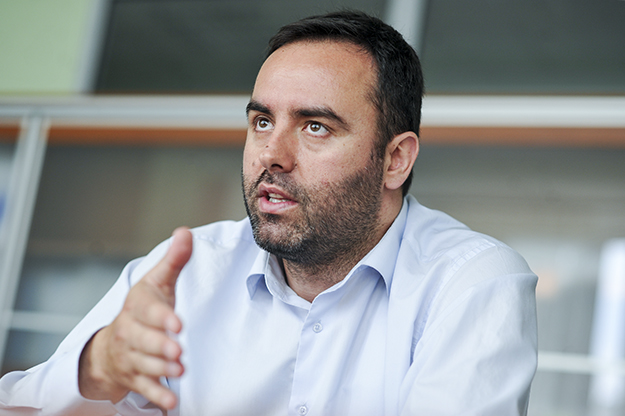In the nearly two decades since the war ended, the Kosovo government has never been led by a left wing oriented party. However, the influence of parties self-identifying with the left has increased recently, especially after the parliamentary elections held in June 2017. In the current legislature, the Kosovo Assembly features 37 deputies from parties who proclaim to be ideologically positioned left of center.
In recent years, left wing politics in Kosovo has mostly focused around the Vetëvendosje movement, which first started standing in elections in 2010 and officially registered as a party last year. Vetëvendosje achieved its best ever election results in last summer’s parliamentary elections, when it won 32 seats in the Kosovo Assembly, becoming the biggest single party in the parliament.
This number was dramatically reduced in March this year, when 12 Vetëvendosje deputies left the party and established The Group of the Independent Deputies. In the same week, deputy Donika Kadaj-Bujupi also left Vetëvendosje and returned to the Alliance for the Future of Kosovo (AAK), leaving Vetëvendosje with 19 deputies.
The Group of Independent Deputies have all subsequently joined the center-left Social Democratic Party of Kosovo (PSD), who have transformed from a fringe party to one with significant representation in the Kosovo Assembly, and are now led by Prishtina Mayor Shpend Ahmeti, who also left Vetëvendosje this year.
Meanwhile, the Initiative for Kosovo (NISMA), who have six deputies and run four ministries as part of the current coalition government, rebranded earlier this year to become the Social Democratic Initiative, and also espouse a center-left position.
In theory, Kosovo’s left now has three parties competing for voters. But how does this play out in practice? What does it mean to be a left wing party in Kosovo? And can a left wing party ever lead the government? To answer these questions it’s important to look at the context in which Kosovar politics finds itself, and the history of leftism in Kosovo.
A new era
When Slobodan Milošević abolished the autonomy of Kosovo within Yugoslavia in 1989, the circumstances of Kosovar politics changed, as separatist aspirations grew amongst Kosovar Albanians. In the wider context, the end of the ’80s and beginning of the ’90s started with the fall of Communism across central and eastern Europe, and Kosovo was no exception.
The Communist League of Kosovo that was linked with Marxism-Leninism and Titoism ceased to exist in October 1990, creating space for new political parties and ideologies. Amongst Kosovar Albanians, it was a space that was largely filled by the Democratic League of Kosovo and their leader, Ibrahim Rugova.
Internally, the main opponents of LDK came from individuals organized in the Kosovo People’s Movement (LPK), which was associated with Marxism and Leninism. While there were some distinctions between the two organizations in terms of political ideology, with LDK embracing more conservative values, it was issues addressing separatism from Yugoslavia and the relationship with Albania that really defined both groups, and Kosovar politics as a whole.

One of the founders of the Vetëvendosje movement , Glauk Konjufca, believes that organizations labelled as left wing in the ‘80s and ‘90s were often far more concerned with Kosovo’s position than the ideology of the left. Photo: Atdhe Mulla / K2.0.
As Glauk Konjufca, one of the founders of Vetëvendosje puts it, the left in Kosovo before 1999 was organized in groups that were far more concerned with the position of Kosovo within Yugoslavia than in having a debate about leftism or any other established ideological platform.
“Although I have reviewed LPK documents, I did not read any intellectual debates about Marxism, Leninism, global positions or the problems of the left,” Konjufca tells K2.0. “This makes me think that their ideology was influenced by geopolitical regional circumstances: Albanians are separated, the peak of our representation is [the state of] Albania, Albania is ruled by Enver Hoxha so our position should be with Enver Hoxha because within Yugoslavia [Albanians] are divided.”
Later, key leading figures from LPK were engaged in organizing the Kosovo Liberation Army (KLA) which in the late ’90s started armed actions against Serbian state apparatus. The leadership of the KLA was largely labelled as influenced by the ideas of Marxism-Leninism, though unification with Albania remained the main cause of the KLA, and was something every KLA soldier swore an oath on.
After the NATO intervention, the installation of the UN administration in Kosovo (UNMIK) and the demilitarization of the KLA, some of these figures converted to political life by forming the Democratic Party of Kosovo (PDK) whose leadership were all involved in the KLA. The head of the KLA’s political wing, Hashim Thaçi became the president of the party, while Jakup Krasniqi and Xhavit Haliti were also key figures in both organizations.
Response to international influences and right wing policies
The post-war governance of the UN left Kosovo with a framework of governance that many now see as having a right-wing bent. Artan Mustafa is a researcher and lecturer on state welfare policy based in Prishtina. He believes that the United Nations Mission in Kosovo (UNMIK), which administered Kosovo until independence alongside other international organizations, cemented neoliberal policies that favor other ideological positions but not the left.
“The World Bank installed the institutional framework of Kosovo after the war by advising UNMIK, but also by influencing its main donors,” Mustafa tells K2.0. “As such, they also impacted the political process because of the introduction of neoliberal policies in the economy.”
Part of these neoliberal policies, as well one of the most prominent political issues of time, was the privatization of state owned companies, in which the international community had a crucial role. Both LDK and PDK, the latter having seemingly abandoned any Marxist ideologies of the KLA, supported this privatization process.
It was against this backdrop that the Vetëvendosje movement was formed in 2005, later incorporating some old figures from LPK unhappy with the behavior of PDK. Its founders cited dissatisfaction at the privatization process, as well as the lack of a resolution over the final status of Kosovo as reasons for establishing the movement, which started with expressions of discontent on the streets.
They also opposed what they described as the hegemonic role of the international community, a role that they felt was being supported by local politicians. This relationship with the international community still defines many of Kosovo’s left wing parties today.

Despite leaving Vetëvendosje for the Social Democratic Party, Visar Ymeri is still an outspoken critic of the role of the international community in post-war Kosovo. Photo: Atdhe Mulla / K2.0.
For Visar Ymeri, the former president of Vetëvendosje and currently the deputy president of the Social Democratic Party, the interference of the international community has had a very negative impact that goes beyond economic consequences.
“On one side it has damaged the economy of Kosovo, and secondly there have been ambassadors that have had an unacceptable fight against a political party [Vetëvendosje] that has has a critical point of view on certain issues by labeling us as anti-American, anti-European Yugoslavs and so on,” Ymeri states. “This harmed democracy because it left the impression that the society should think homogeneously, whilst this is not the case in the countries from which these diplomats came.”
Flags and symbols
In its early days as a protest movement, Vetëvendosje was also critical of the damage done to Kosovo’s sovereignty, and criticised the process of the declaration of independence in 2008. They were especially outspoken on issues related to symbols, the country’s flag and anthem.
Ymeri, then vocal against these processes continues to believe that the symbols do not reflect the will of the people. “Certainly we recognize them as symbols of Kosovo and until the moment they change these will be Kosovo symbols, but this does not mean that we agree with them,” Ymeri says.
A focus on issues of symbols and national identity have often been used as a criticism of self described left wing parties in Kosovo, especially Vetëvendosje, with critics often describing the party as more of a nationalist party than a left wing party.
Vetëvendosje’s Konjufca believes that most left wing theorists do not exclude nationalism from their vision. “Within Marxism and Leninism, the solution of national issues is very important,” he says, offering examples from Europe of such cohabitation between the left and nationalism. “I see Vetëvendosje as being like Sinn Fein [Irish Republican Party]. They are also very leftist and are nationalists that want to unite Ireland and there is nothing wrong here.”
"I think that what should happen today, especially in the Republic of Kosovo, is that politics should move on from ethnic identities."
Vice-President of the Social Democratic Party, Visar Ymeri.
Ymeri of the Social Democratic Party also believes that discussions on national identity does not exempt talk about the left. However, Ymeri’s departure from Vetëvendosje seems to have brought about a change of rhetoric. “I think that what should happen today, especially in the Republic of Kosovo, is that politics should move on from ethnic identities because it damages the image of an equal republic for all citizens,” he tells K2.0.
Sead Zimeri is a lecturer of Philosophy at the University of Trømso in Norway. Despite being a critic of Vetëvendosje’s nationalism, he believes that the debate over the subject is exaggerated and fails to acknowledge the context that Kosovar society has been operating in.
“It’s absurd to look for a movement or a party that does not reflect [nationalism or identity issues], because nationalism, has, in some ways,been the only way that Kosovar Albanians could identify themselves, and certainly Vetëvendosje could not escape from this,” Zimeri says.
Mustafa argues that nationalism exists across the political spectrum in Kosovo, and has always been used to gain support. “Nationalism historically has served to get votes and come to power, from PDK at its beginning to LDK,” he says.
The birth of NISMA
In 2013, a split within PDK led to the creation of the Initiative for Kosovo (NISMA), or the Social Democratic Initiative as they have recently renamed themselves. While Vetëvendosje have often wrestled with accusations of nationalism, the Social Democratic Initiative is often faced with other allegations.
The party’s leadership, Fatmir Limaj and Jakup Krasniqi, were both key figures in PDK before the split, and their history and record in governance, both in PDK and since the formation of the new party, has often drawn critics to question their belief in the left wing values they espouse on paper.
“In essence, in their style of governance, NISMA is similar to others,” Artan Mustafa tells K2.0. “Their clientelist model is even more intensive, as their leadership were at the head of institutions in the postwar years when neoliberal policies have been shaped in Kosovo.”
Frank Hantke is the Director of Friedrich-Ebert-Stiftung (FES), a foundation that promotes social democratic values. For Hantke, the social democratic principles espoused by the Social Democratic Initiative are only theoretical, and that pragmatism is the core value of their political actions. “NISMA is looking where the wind is coming from and for their piece of the cake,” he says.
K2.0 contacted Social Democratic Initiative deputies Bilal Sherifi and Haxhi Shala to discuss these issues but received no response.
The desire for power
While the Social Democratic Initiative entered into a 2017 coalition with center-right parties AAK and PDK, securing themselves a place in the current coalition government in the process, power-sharing and securing a role in central government has always eluded Kosovo’s largest self-described left wing party, Vetëvendosje.
Although Vetëvendosje became the single biggest party after the June 2017 elections, it failed to create a post electoral coalition that would lead to the formation of a government led by the party’s founder Albin Kurti. Efforts were made, in particular with LDK, but in the end no coalition was reached, and a role in central government eluded the party for the third consecutive election.
For Konjufca, Vetëvendosje should not be fearful of taking power or just believing in the ‘utopian left.’ “As [Slavoj] Žižek says, we should not be frightened of power. He criticises a utopian left that wants to preserve its practical virginity in the name of a theory,” Konjufca says, before adding, “I think we should be in power. You understand the ideology better when you are in power.”

FES director Frank Hantke believes that Kosovo’s left wing parties can only achieve real change if they come to power. Photo: Majlinda Hoxha / K2.0.
For Hantke, without coming to power Vetëvendosje’s discourse is insufficient to bring change. “I said to them that you can stay in opposition and be 100 percent clean but you can only change things when you are in power, especially in places like Kosovo where the opposition has no real power,” he says.
Although Hantke claims that Vetëvendosje is the only party in his mind in regard to a potential governing left wing party in Kosovo, he still identifies the fact that Vetëvendosje still does not operate as a party but as a movement as one of the main issues.
“They are still sometimes behaving as a movement and it makes it difficult for us Western Europeans to understand them as a party, as Western Europe will not accept tear gas canisters at the Assembly,” Hantke says, referencing Vetëvendosje deputies’ protests against the demarcation deal with Montenegro.
Zimeri believes that in order to come to power, Vetëvendosje must change fundamentally. “It is a political necessity that if Vetëvendosje want to govern, there is no other alternative but to soften the leftist discourse and accept the rules of capitalism,” he says.
However, unlike Hantke, Zimeri believes that the organization’s influence would be more visible if it had not transformed into a registered political party. Instead, he feels Vetëvendosje should get back to their roots as a movement and remain a ‘political school.’ “The image is damaged when you become a party, even when the interests of the party match that of society,” he says.
Representing who?
That question of how representative of society, especially its more economically disadvantaged elements, is key for Kosovo’s left wing parties. The Social Democratic Initiative’s support is largely regionalized in Malisheva, rather than based around class, while the newly bolstered Social Democratic Party’s voter base is yet to be measured at the ballot box, though a poll conducted last week by the Kosovar Democratic Institute (KDI) placed them on 2.4 percent of the vote.
Vetëvendosje’s base spreads across the country, but is rarely found in the roughly 29 percent of Kosovo’s population that lives in relative poverty. “When I saw some sociological studies I saw that the vast majority of [Vetëvendosje] voters are middle and upper class,” Konjufca tells K2.0. “It means that Vetëvendosje is not representing the poor. It is a bit weird because I always thought that Vetëvendosje is supported by poor masses.”
Moreover, Konjufca says that the voters of Vetëvendosje have also been said to be more urban and with higher levels of education. This theory is supported by Vetëvendosje’s performances in local elections, where the party have won mayorships in Kosovo’s two largest cities, Prishtina and Prizren.

Researcher and lecturer on social policies Artan Mustafa believes that Vetëvendosje’s support is largely urban and intellectual and lacks the coalition of classes that characterize Western social democratic parties. Photo: Atdhe Mulla / K2.0.
Mustafa also employs the same analysis. “Vetëvendosje has the support of an urban, intellectual class who have been involved in political actions,” he says, adding that membership to the party has also tended to be from the same social group. “Slowly it has started to develop the profile of a social democratic party but has never achieved a coalition of classes that characterize social-democratic parties in the West.”
Hantke echoes Mustafa’s claim, and hopes for more practical policies from the party aimed at the working class. He also criticizes Vetëvendosje for focussing on solely intellectualism. “They have to change their attitude partly, because they need to have votes from people who haven’t read Marx as well. They need to be understable to everyone,” he says.
PSD’s Ymeri is self-critical and reflects that the left should do more, particularly in supporting the working class. “We speak about workers only on May 1 or when any worker loses their life in the construction industry, but at other times we do not dedicate our attention to workers,” he says. “Social democratic parties especially should be talking about them a lot.”

Philosophy lecturer Sead Zimeri feels that Kosovo’s left should be far more focussed on the issue of workers’ rights and the protection of the labor force. Photo courtesy of Sead Zimeri.
For Zimeri, the whole energy and focus of the left should be in protecting the rights of the labor force. “Workers’ rights should be the ideal of the left in Kosovo and the left in Kosovo, particularly Vetëvendosje, has no other solution but to follow this ideal,” he says. “Protecting workers’ rights, not leaving people to be used in an undignified way — these are local problems and not of capitalism.”
For Mustafa, these issues have been obscured by nationalism and the ongoing issues with Kosovo’s statehood. “The problem of economic inequality has never been at the top of the agenda for Vetëvendosje,” says Mustafa. “Issues pertaining with nationalism have always dominated and certainly this came as a consequence of not closing the issue of statehood,” he adds.
For Hantke, all of Kosovo’s left wing parties have failed to create a clear program that will bring practical economic changes in the society. “There is no one talking about strong links between education and the labor market,” he says. “There is no one speaking about links between the labor market, education, skills, employment and business.”
Although self critical, Konjufca still believes that the left wing policies introduced by Vetëvendosje have paid off. “The 40-point plan could have had an influence on the 100 percent increase in Vetëvendosje votes,” he says, referencing last year’s parliamentary election results. “Vetëvendosje introduced direct measures that are leftist, such as establishing the National Bank as we are against the banks that are ripping the citizens off, or the public fund for children, all of these are leftist policies.”
“The left should fight for the rights of marginalized groups, be it religious, ethnic, sexual or any other community."
Philosophy lecturer Sead Zimeri.
Although Vetëvendosje has not had the chance to implement the 40-point plan at a national level, their program has been tested at the local level in the Municipality of Prishtina, after the party’s candidate won the mayoral election in both 2013 and 2017. In his 2013 mandate, incumbent Mayor Shpend Ahmeti, who now heads PSD, implemented a blueprint devised while in Vetëvendosje, which put an emphasis on education and health.
Mustafa has an ambivalent take on Ahmeti’s first term. “Services improved, taxes for the rich increased a bit and all these are good steps,” he explains, but adds that it is still an underwhelming return for a party with such an outspoken leftist discourse.
Other analysts also feel that something is missing from this discourse. Zimeri believes that the left should play a more emancipatory role in society and be more vocal about other causes. “The left should fight for the rights of marginalized groups, be it religious, ethnic, sexual or any other community,” Zimeri says.

Despite criticism over the issue, Vetëvendosje activist Nazlie Bala believes that the party is working towards social emancipation, especially in the field of gender equality. Photo: Atdhe Mulla / K2.0.
Nazlie Bala, a well-known Vetëvendosje activist sees the issue differently and insists that Vetëvendosje has played a leading emancipatory role in Kosovar society, at least on the issue of gender equality. “One of the five parts of Albin Kurti’s platform [when he was a candidate for the head of Vetëvendosje] addressed the gender issue,” she argues. “Now that is part of the agenda of Vetëvendosje and we have documents that demand the inclusion of women, and gives them a role in decision making.”
Unlike other political parties in Kosovo, Vetëvendosje doesn’t have a designated forum for women. Bala feels that rather than a weakness, this shows a positive view of women’s role in politics. “We do not see women as statistics but as equal, because without gender equality there is no equal society,” she argues.
A united front?
A more equal society tends to be the vision of most left wing governments, though forming a government led by a left wing party seems a long way off in Kosovo. A united front of the three parties also does not seem likely, at least in the near future, with Vetëvendosje and PSD still healing the wounds of the split. Meanwhile, the Social Democratic Initiative’s history leaves little room to believe that the three self-proclaimed left wing parties could form a coalition of left oriented parties.
Bala thinks that it would be healthy for democracy to have a united front but she insists that before that happens some pre-conditions should be met. “It is not sufficient to change only the name while your political actions are associated with the right wing,” she says.
PSD’s Ymeri believes that, in the long term, the left oriented parties should have a plan to work cooperatively, and in the more immediate future they should focus their efforts on fighting the capture of the state by PDK. “The unification of political forces to de-capture the state would be in the interest of all political forces, although the parties do not have common ideological lines,” Ymeri says.
His former colleague from Vetëvendosje, Konjufca, echoes Ymeri’s stance. “We have to bring the country to a position where the rule of law prevails,” he states, describing contemporary Kosovar politics as being in “a pre-ideological phase.”
This nascent era for Kosovar politics has created a situation in which Kosovo’s self-proclaimed left wing have often been characterized by a focus on Kosovo specific issues like statehood, corruption, or identity, and while the left appeared to be growing last summer, recent splits have dented these notions.
If a left wing government can ever be formed, it will likely be after at least a quarter of a century of right-leaning policies having been put in place. While the left in Kosovo still seems to be growing and evolving, the challenge ahead is huge.K
Feature image: Atdhe Mulla / K2.0.







